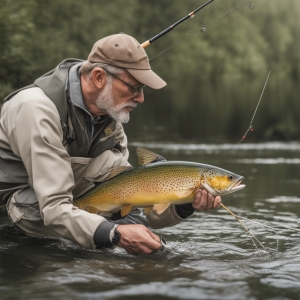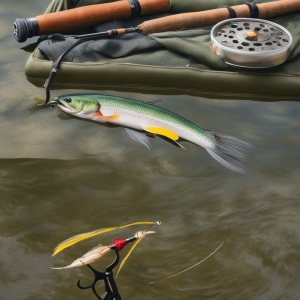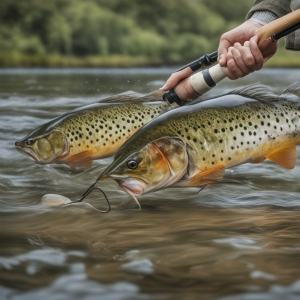Table of Contents:
When it comes to fishing, the technique you choose plays a significant role in your success and enjoyment. Two popular methods of fishing are fly fishing and spin fishing. While both offer unique experiences, each presents different challenges and benefits that can affect your approach and strategy.
This article will help you understand the differences between fly fishing and spin fishing, and will provide insights that will help you decide which fishing method is right for you. To make an educated decision, we'll explore several factors including the type of fish you're targeting, the body of water you're fishing in, and your personal preferences.
Introduction: Choosing the Right Fishing Technique for You
We all know that fishing is not just about catching fish; it's also about enjoying the great outdoors. The kind of fishing technique you choose, whether it be fly fishing or spin fishing, can alter your experience in nature drastically. Our aim is to help you choose the right fishing method to ensure that you have the best experience possible. So, let's dive in!
Understand the Basics: What is Fly Fishing?
Fly fishing is a style that requires skill, precision, and patience. It uses a light-weight lure-- called a fly-- to catch fish. The fly is cast using a fly rod, reel, and specialized weighted line. The casting technique is a bit different and may take some time to master, as it requires the angler to whip the line back and forth. The goal is to mimic the movement of real insects on which fish feed.
Fly fishing can be done in fresh or salt water. It is especially well-suited for catching trout and salmon, but with enough practice and the right equipment, you can catch nearly any type of fish with this method. Despite these advantages, fly fishing can be challenging - but extremely rewarding - for beginners.
A Comparative Analysis: Fly Fishing and Spin Fishing Techniques
| Fly Fishing | Spin Fishing | |
|---|---|---|
| Pro | Offers a more challenging and rewarding experience | Easier to learn and master for beginners |
| Pro | Enables better control of the fishing line and lure | Easier to cast longer distances |
| Pro | Allows fishing in diverse environments, even in shallow water | Can handle larger and heavier baits and lures |
| Con | Requires more skill and practice to master | Less control over the fishing line and lure compared to fly fishing |
| Con | Equipment tends to be more expensive | Not ideal for diverse and shallow water fishing |
Decoding the Process: How Does Spin Fishing Work?

Spin fishing, on the other hand, is a more conventional method of fishing and may be more comfortable for beginners. In spin fishing, you use a lighter line and a spinning rod. The aim is to cast a heavier lure that can sink below the water's surface. This technique uses a spinning reel, which makes casting a lot simpler.
Spinning reels can handle a variety of fishing lines and can be used across many different environments. They are great for targeting a wide range of fish species, from tiny stream trout to large saltwater fish. Spin fishing is usually faster in pace than fly fishing, which some anglers may prefer. However, keep in mind that part of the challenge and fun with spin fishing is fighting with the fish!
Main Differences Between Fly Fishing and Spin Fishing
Now that you know the basics of both fly fishing and spin fishing, let's delve into their main differences. Understanding these differences is key to deciding which technique suits you best.
First, equipment use varies significantly between the two methods. Fly fishing uses lighter and specialized gear while spin fishing involves regular fishing rods and heavier lures. This results in distinctly different casting styles – a rhythmic, repetitive motion for fly fishing compared to a one-off, aim-and-cast approach in spin fishing.
Second, the nature of the lure is another notable difference. Fly fishing relies on lightweight, lifelike flies meant to imitate real insects, while spin fishing employs heavier, often metallic lures designed to attract fish by their movement and reflection in the water.
Lastly, catch and release is a common practice in fly fishing to preserve fish populations, whereas spin fishing is often used for catching fish to keep. This is due to the fact that fly fishing hooks are easier to remove with minimal damage to the fish. In contrast, spin fishing lures often have multiple hooks, which can make safe unhooking more challenging.
Remember, neither method is inherently better than the other; it's all about what brings you the most satisfaction and fits your fishing goals.
Factors to Consider: Choosing Between Fly Fishing and Spin Fishing

While deciding on the ideal fishing technique for you, there are important points to note. They include:
1. Environment: Your fishing location plays a vital role. Fly fishing is best suited in areas with wide and open spaces due to the back and forth casting. Clear rivers or large lakes are ideal. Conversely, spin fishing is versatile. It can be done in compact spaces, fast-moving waters, or fishing from a boat in the sea.
2. Species of fish: Targeting specific fish can determine your choice. Fly fishing is ideal for trout, salmon, and carp while spin fishing works best for fish like pike, perch, or zander.
3. Personal Preference: Comfort and enjoyment are crucial when fishing. If you prefer a relaxed, rhythmic, and slightly complex style, you might enjoy fly fishing. On the other hand, spin fishing offers simplicity, versatility, and is straightforward.
4. Budget: Fly fishing gear tends to be on the pricey side because of its specialized equipment. If budget is a constraint, spin fishing gear is a more economic choice. It’s worth mentioning, a well-maintained gear, no matter the type, will serve you for a good period of time.
5. Skill Level: Spin fishing is generally easier to learn, making it great for beginners. Fly fishing requires more precision and can be difficult for first-timers, but once the casting technique is mastered, it can yield great fulfillment.
In conclusion, the choice between fly fishing and spin fishing is very individual. Take your time and experiment with both. The most important thing is that you enjoy the experience!
Conclusion: Fly Fishing or Spin Fishing - Making Your Choice
It all boils down to your personal needs and preferences when choosing between fly fishing and spin fishing. Fly fishing is an art form in itself and can be incredibly rewarding and tranquil. If you love both the catch and the chase, fly fishing might be your ideal fit. It's also worth considering if you enjoy being one with nature or if you're up for a challenging, skill-refining experience.
If you prefer something more straightforward, then spin fishing may suit you better. It is easy to learn, versatile, and suitable for catching a wide range of fish. Its also a good match if you love thrilling battles with your catches.
Take into account where you'll be fishing, what kind of fish you want to catch, and what style of fishing appeals to you. Remember, the prime objective is to have fun and relish the joy of fishing. Don't rush. Try both techniques to see which resonates with you best. Happy fishing!
Fly Fishing vs Spin Fishing: Your Top 5 Questions Answered

What is the main difference between fly fishing and spin fishing?
The main difference lies in the techniques of casting and the type of gear used. In fly fishing, the line is cast rather than the lure. But in spin fishing, the lure is cast, which then pulls the line out.
Which technique is easier for beginners?
Spin fishing is generally considered easier for beginners to pick up as it requires less control and precision than fly fishing.
Is one technique more effective than the other?
The effectiveness depends on various factors like the type of fish targeted, the fishing environment, and personal skill. Neither technique is uniformly superior to the other.
What kind of fish can I catch with each technique?
You can catch a wide variety of fish with both techniques. However, fly fishing is often preferred for species like trout and salmon, while spin fishing can be more effective for catching bass or pike.
Do I need different equipment for each technique?
Yes, fly fishing and spin fishing require different types of rods, reels, and tackle. Understanding the kinds of fish you want to catch and the conditions you'll be fishing in can help determine which equipment is best for you.







